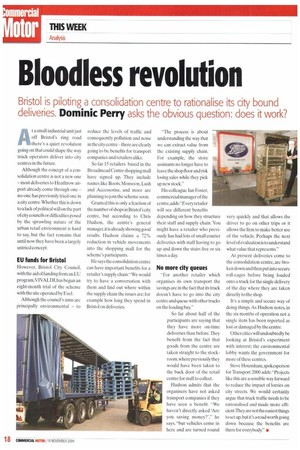Bloodless revolution
Page 18

If you've noticed an error in this article please click here to report it so we can fix it.
Bristol is piloting a consolidation centre to rationalise its city bound deliveries Dominic Perry asks the obvious question: does it work?
At a small industrial unit just off Bristol's ring road there's a quiet revolution going on that could shape the way truck operators deliver into city centres in the future.
Although the concept of a consolidation centre is not a new one — most deliveries to Heathrow airport already come through one — no-one has previously tried one in a city centre. Whether this is down to a lack of political will on the part of city councils or difficulties posed by the sprawling nature of the urban retail environment is hard to say, but the fact remains that until now they have been a largely untried concept.
EU funds for Bristol
However, Bristol City Council, with the aid of funding from an EU program,V1VALDI,has begun an eight-month trial of the scheme with the site operated by Exel.
Although the council's aims are principally environmental — to reduce the levels of traffic and consequently pollution and noise in the city centre —there are clearly going to be benefits for transport companies and retailers alike.
So far 15 retailers based in the Broadmead Centre shopping mall have signed up. They include names like Boots, Monsoon, Lush and Accessorise, and more are planning to join the scheme soon.
Granted this is only a fraction of the number of shops in Bristol's city centre, but according to Chris Hudson, the centre's general manager,it is already showing good results. Hudson claims a 72% reduction in vehicle movements into the shopping mall for the scheme's participants.
He says the consolidation centre can have important benefits for a retailer's supply chain:"We would try to have a conversation with them and find out where within the supply chain the issues are; for example how long they spend in Bristol on deliveries. "The process is about understanding the way that we can extract value from the existing supply chain. For example, the store assistants no longer have to leave the shop floor and risk losing sales while they pick up new stock."
His colleague Ian Foster, commercial manager of the centre,adds:"Every retailer will see different benefits depending on how they structure their staff and supply chain. You might have a retailer who previously has had lots of small courier deliveries with staff having to go up and down the stairs five or six times a day.
No more city queues
"For another retailer which organises its own transport the savings are in the fact that its truck doesn't have to go into the city centre and queue with other trucks on the loading bay."
So far about half of the participants are saying that they have more on-time deliveries than before. They benefit from the fact that goods from the centre are taken straight to the stockroom.where previously they would have been taken to the back door of the retail centre for staff to collect.
Hudson admits that the organisers have not asked transport companies if they have, seen a benefit. "We haven't directly asked 'Are you saving money?'." he says, "but vehicles come in here and are turned round very quickly and that allows the driver to go on other trips or it allows the firm to make better use of the vehicle. Perhaps the next level of evaluation is to understand what value that represents."
At present deliveries come to the consolidation centre, are broken down and then put into secure roll-cages before being loaded onto a truck for the single delivery of the day where they are taken directly to the shop.
It's a simple and secure way of doing things. As Hudson notes, in the six months of operation not a single item has been reported as lost or damaged by the centre.
Other cities will undoubtedly be looking at Bristol's experiment with interest; the environmental lobby wants the government for more of these centres.
Steve Hounsham, spokesperson for Ti-ansport 2000 adds: "Projects like this are a sensible way forward to reduce the impact of lorries on city streets. We would certainly argue that truck traffic needs to be rationalised and made more efficient.They are not the easiest things to set up. but it's a road worth going down because the benefits are there for everybody." •
























































































































































































